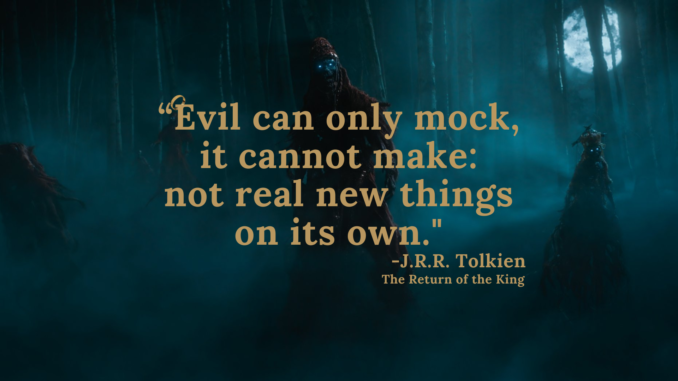
Amazon’s The Lord of the Rings: The Rings of Power was one of the most anticipated shows in recent memory with the promise to transport fans back to J.R.R. Tolkien’s Middle-earth. However, when the series finally debuted, many of those same fans felt betrayed and outraged by the liberties taken with Tolkien’s legacy. So here are 10 things that Amazon’s The Rings of Power did that blatantly disrespects J.R.R. Tolkien.
1. Dismissal of Tolkien’s Narrative
Tolkien created a rich and intricate lore for Middle-earth which the writers have ignored canonically. That includes the character of Morgoth and his downfall which is pivotal to the mythology of the world. However, in one scene, Adar dismisses the original story of Morgoth’s crown being used to imprison him saying,
“There are many stories of what happened after the Silmarils were pried from its settings.”
That opening line immediately and casually dismisses Tolkien’s account of Morgoth’s crown, read about in The Silmarillion, which was used to restrain him. This occurring when the Valar came for Morgoth, waging war, who was then cornered in the depths of Angband where his feet were cut off and his crown turned into a collar for him By dismissing this history with a throwaway line, The Rings of Power downplays and dismisses a crucial element of Tolkien’s world-building, in favor of their version of Middle-earth, by showing a lack of respect not just for the depth of the mythology, but for Tolkien himself.
The scene of Adar telling Galadriel about Morgoth’s crown is reminiscent of other franchises which have been taken over by writers who, sooner or later, show their lack of respect for the creators and the lore. For example, Star Trek Discovery has a scene where a janitor named Gene is disrespected and treated in a dismissive manner, which is how the show treated Roddenberry’s views of the future and what Starfleet personnel should be like.
So, too, have the writers for The Rings of Power shown their lack of disrespect for the father of modern fantasy and his narrative.
2. Galadriel’s Anti-Feminine, Girlboss Portrayal
Tolkien’s Galadriel is one of the most revered characters in his legendarium – a wise, powerful, and graceful elf who lived in Middle-earth for thousands of years. However, Amazon’s portrayal of Galadriel as a magically impotent, impulsive, war-hungry “girlboss” clashes with her established character. This version of Galadriel is a product of current storytelling where female characters must often reject traditionally feminine traits and adopt toxically masculine ones in order to appear “strong.”
In Tolkien’s world, Galadriel’s strength came from her wisdom and her understanding of restraint, not her desire to lead armies and seek revenge – a sorceress of great power who learned from Melian the Maiar (not the Valar as TROP gets wrong). Which is why The Rings of Power’s Galadriel is referred to as Guyladriel by Tolkien fans because she is a misogynistic fanfic version of the character Tolkien created.
If that weren’t enough, the writers, rather than depicting her as a faithful wife, decided to depict Guyladriel as a faithless slut, by elven standards, written to appeal to modern women (Hoeflation is real).
How Tolkien would feel about the changes to his characters is best left up to the author himself who said,
“I do earnestly hope that in the assignment of actual speeches to the characters they will be represented as I have presented them: in style and sentiment. I should resent perversion of the characters (and do resent it, so far as it appears in this sketch) even more than the spoiling of the plot and scenery.”
J.R.R. Tolkien
Letter 210”
3. Disney Sauron: A Simplistic Villain
Speaking of fanfic versions of Tolkien’s characters, one cannot help but mention Sauron, Morgoth’s servant who took up the mantle of the Dark Lord. Tolkien’s depiction of Sauron was more nuanced than the mustache-twirling villains of modern fantasy. Sauron’s evil could be subtle, manipulative, and strategic. Yet in The Rings of Power, the portrayal of Sauron feels more like a Disney villain – simplistic, obvious, and devoid of the depth Tolkien intended with the added cringe factor of seemingly desiring friendship and love.
While Tolkien himself avoided delving too deeply into Sauron’s character, preferring to leave him as a shadowy figure whose presence loomed over Middle-earth, the framework provided gave readers an awesome account and potential for him being on the screen. Especially when it comes to the rings of power and their creation.
However, rather than a series of events that truly showed us Sauron’s potential and why he is one of the greatest villains, The Rings of Power gave us a warped, muddled, non-cohesive, and disappointing plot for the rings of power where their Sauron could be defeated by orcs and, like a gimped Maleficent, desires friendship, love, and affection. A Sauron who wanted to “heal Middle-earth” rather than just conquer it for his ambition of conquering and ruling all of Middle-earth.
Instead of a villain of true evil, Tolkien fans witnessed a modern-day, misunderstood villain with a heart of gold who wanted Celeborn’s sloppy seconds from a faithless Galadriel.
4. Istari in the Second Age: Gandalf’s Premature Arrival
One of the biggest lore-breaking decisions in The Rings of Power is the introduction of an Istari who, unsurprisingly, turns out to be Gandalf in the Second Age. According to Tolkien’s writings the Istari, or wizards, did not arrive in Middle-earth until the Third Age to assist in the fight against Sauron. The reason for this being that their purpose was tied to the later stages of Middle-earth’s history, making Gandalf’s appearance in the Second Age not only out of place but a violation of the chronological structure of Tolkien’s world.
A decision that undermines the intended role and mystery of the wizards while also undermining the themes and downplaying events of the Second Age.
5. Ignored Tolkien’s Vision of Elven Love
Elven love in Tolkien’s writings is treated with reverence and portrayed as a deep, almost spiritual connection between souls. It is not subject to the whims and fleeting passions of mortal love or the vapid, empty, and casual views of modern society views on relationships and sex. However, The Rings of Power reduce elven love to something far more pedestrian and human-like.
Which makes the kiss between Galadriel and Elrond, though strategic, a ploy that would have never convinced anyone in Tolkien’s Middle-earth given how elves treat and approach love. Which is why it shouldn’t have fooled Adar who was an elf once. As for the idea that Galadriel would have looked at anyone else, especially Halbrand/Sauron, even if Celeborn was dead, doesn’t justify this non-elven behavior. An arc that the writers lazily created to appeal to a specific demographic at the cost of ignoring everything about Tolkien’s elves turning the aforementioned Galadriel into the Slut of Mordor.
6. Plagiarized Phrases: Inferior Versions of Iconic Lines
Fans of Tolkien’s works cherish his eloquent and poetic language which has become iconic. Yet The Rings of Power borrows phrases and themes from his works, only to reduce them to clunky and inferior versions. The use of dialogue that mirrors Tolkien’s original lines, but with a modern twist, changed words, or reworded, feels like an attempt to ride on the coattails of his brilliance without capturing the depth and gravitas of his words.
There are many examples of The Rings of Power pilfering from Tolkien’s work. Tom Bombadil repurposing Gandalf’s lines from The Lord of the Rings is one such example (check out “Gandalf’s reactions to his lines being stolen). But one of the most egregious examples came from season one that involved Sauron and Galadriel. In the books, one of the most memorable scenes comes from The Fellowship of the Ring and the Mirror of Galadriel when Frodo offers the One Ring to the Lady who says,
“…In place of the Dark Lord you will set up a Queen. And I shall not be dark, but beautiful and terrible as the Morning and the Night! Fair as the Sea and the Sun and the Snow upon the Mountain! Dreadful as the Storm and the Lightning! Stronger than the foundations of the earth. All shall love me and despair!”
In Peter Jackson’s trilogy, the dialogue was scaled back and rephrased, but still made an impact,
“In place of a Dark Lord you would have a queen! Not dark, but beautiful and terrible as the dawn! Treacherous as the sea! Stronger than the foundations of the earth. All shall love me and despair.”
However, Amazon’s show not only plagiarized Tolkien’s work, they used it to subvert Tolkien’s Galadriel by having Sauron repeat a truncated version of Tolkien’s lines,
“I would make you a Queen. Fair as the Sea and the Sun. Stronger than the foundations of the earth.”
It’s a hamfisted way to tie The Rings of Power to Peter Jackson’s movies and a despicable implication and “canonization” of the idea that Sauron and Galadriel had an intimate history with each other (which they didn’t). But this is indicative of a show, poorly written, relying on the plagiarizing of better writing only to still get it all wrong. And the reaction wasn’t that this was epic, but that, to the majority of viewers, this was wrong and epically cringeworthy.
Of course, the plagiarizing of lines and scenes doesn’t stop with just Peter Jackson and Tolkien, The Rings of Power steals from other franchises as well resulting in cringey and ludicrous moments such as Guyladriel’s, “There is a tempest in me!”
7. Ignored Canon: Tolkien’s Own Warnings
Tolkien himself had strict views on how adaptations of his work should be handled. In his letters, he expressed concern about the integrity of Middle-earth and its mythology being compromised,
“The canons of narrative in any medium cannot be wholly different, and the failure of poor films or poor dramas is often precisely in exaggeration and the intrusion of unwarranted matter owing to the desire for effects and spectacle.”
The Rings of Power ignores this and indulges in spectacle, both visually and narratively, at the cost of integrity and quality which fans have not forgotten and will not forgive. Meanwhile, the general audience couldn’t be bothered with The Rings of Power’s “canon” and are not awed by its visuals which pale in comparison to the LOTR movies which had a far smaller budget ($281 million) than The Rings of Power ($1 billion).
Faulkiens have fanatically defended the complete overhaul of Tolkien’s work, screaming that The Rings of Power adheres to Tolkien’s themes, if not the history and story crafted by the author.
8. Creating a Show Without Access to Source Material
Perhaps the most damning aspect of The Rings of Power, and a main point used to defend the show by its fans, is the fact that the writers were unable to access the full rights to Tolkien’s works: specifically The Silmarillion, Unfinished Tales, and other key texts of the Second Age. Instead of respecting this limitation, the showrunners still chose to create their own version of Middle-earth using vague references and original content that often diverges, in most cases wildly, from Tolkien’s vision. This has led to the plausible insinuation that the writers purposely set out to create a “non-Tolkien” series, one that references his name for promotions but disregards his careful world-building, views, and themes.
The fact this show was created knowing that there was no access to the source materials is a decision that has to be studied, from a business perspective, for the ludicrous results that have occurred as a consequence of it. Even the animated films of the 80s, while not entirely faithful, stayed true to the history and stories of Middle-earth in their own way. Even the Peter Jackson movies strayed from the source material but still managed to stay faithful, with some exceptions, that resulted in Tolkien fans and general audiences loving the movies and garnering a plethora of awards. The Rings of Power, however, simply took names of characters and places and injected them into a story vastly different and inferior to the one originally created with lackluster results and barely any accolades.
9. White Orcs and DEI Agenda: Tolkien Was Not a Racist
Amid the entire retconning of Tolkien’s work, one of the most glaring choices in The Rings of Power was the inclusion of a diverse cast among Elves, Númenóreans, and even orcs. While diversity and representation are important in modern media and reflect the melting pot that is America, and many modern western countries, injecting this into Tolkien’s world raises questions about the series’ underlying message. Especially when there is no logical explanation for a melting pot within the aforementioned races.
Of course, Amazon, the writers, actors, and Faulkiens immediately pounced on anyone who dared to point this out and refer to Middle-earth’s history; immediately calling them racists and bigots as a shield for their inability to defend their position while simultaneously implying that Tolkien himself was a racist as well.
The presence of “white orcs,” for example, in The Rings of Power certainly sends a message that the writers believe that Tolkien was racist. A narrative that has been pushed prior to the show’s release that Tolkien’s orcs were a representation of certain groups of people and is a belief that is substantiated by the inclusion of white orcs in the show.
Then there are the diverse depictions of characters like the “melting pot” of elves and Queen Míriel, who was color-washed as a woman of color, that further implies Tolkien’s Middle-earth lacked representation and proof that the author was racist. A claim that is deeply misleading and offensive to Tolkien’s work, which emphasized moral rather than racial divisions. Then there are characters like the non-binary-looking priestess, nicknamed “Feminem” due to the character’s appearance, which only further fueled suggestions that diversity, equity, and inclusion (DEI) were the focus of the show and shoehorned into a narrative where they didn’t belong or enhance the story.
Which has been pervasive, not just in Hollywood, but in video games as well. Considering how much world-building the writers have done, they could have at least provided plausible explanations and canon for this diversity in their version of Middle-earth.
10. The Commercialization and Usurpation of Tolkien’s Legacy
The reality is that nothing is made to purposefully lose money. Even The Lord of the Rings movies were created with the goal of making a profit. However, there is a huge difference between the writers of the movies and The Rings of Power series as well as New Line Cinema and Amazon MGM Studios.
One of the most troubling aspects of The Rings of Power is that it prioritizes profit over artistic integrity. The massive $1 billion investment in the series, the focus on creating a long-running franchise, and the attempt to appeal to the broadest possible audience is proof that the show was created with commercial success in mind rather than a deep respect for Tolkien’s intricate world-building and timeless themes. Not just that, but the usurpation of Tolkien’s story was for the sake of a DEI-driven, modernized product made to pander and sell subscriptions.
Tolkien’s works were a labor of love that were written with care, depth, and a sense of profound moral purpose. Peter Jackson attempted to treat his movies the same way and with respect to the work he was adapting. As a result, Jackson and New Line Cinema were rewarded with a huge box office profit and an insane amount of alternative means of monetary success through merchandising everything and anything.
In contrast, The Rings of Power is a mass-produced, formulaic and generic fantasy series rather than an authentic extension of Tolkien’s mythos. This commodification and usurpation of Middle-earth, reducing it to a product meant to drive subscriptions, is the ultimate disrespect to Tolkien’s legacy. The results are not surprising since there is no merchandise and Amazon hasn’t provided any concrete numbers as to how many Prime subscriptions the show has brought in. Instead, Amazon has been coy when it comes to The Rings of Power, for good reason as season 2’s numbers are not looking great.
The Rings of Power, which prioritizes DEI and pandering to a “modern” audience, has turned into an expensive flop. In throwing Tolkien to the side Amazon, and the show’s writers, strangled their golden goose before it could lay a single egg because the writers set out to write their story and not Tolkien’s story with the arrogant mindset that their writing would be a commercial success.
To say that The Rings of Power has sparked a lively debate would be an understatement. Tolkien fans, many of whom feel that the series takes far too many liberties with Tolkien’s work, injecting modern agendas and disregarding core aspects of his mythology, are forever turned off from the show while TROP’s Faulkien fanbase is a prime example of a corporate-grown fanbase of “modern” viewers.”
While adaptations will always involve some changes, the decisions made in this series have gone beyond the definitions of an adaptation into a fanfiction that is a betrayal of Tolkien’s legacy rather than a tribute to his genius.
Amazon’s The Lord of the Rings: The Rings of Power was never meant to be a Tolkienesque show. In fact, the writers themselves said that they wanted to make a Game of Thrones show. The Rings of Power is just the latest product of modernity created by those who have no respect for Tolkien’s work.
How else can you explain that a show called The Rings of Power got the rings of power completely wrong?
So what do you think The Rings of Power has done that disrespects Tolkien? Let us know in the comments section below!
Author’s Note: Support this site by donating via Paypal or even checking out our merchandise on RedBubble where you can find designs that cater to writers and readers. Money donated and raised goes into paying for this website and equipment.
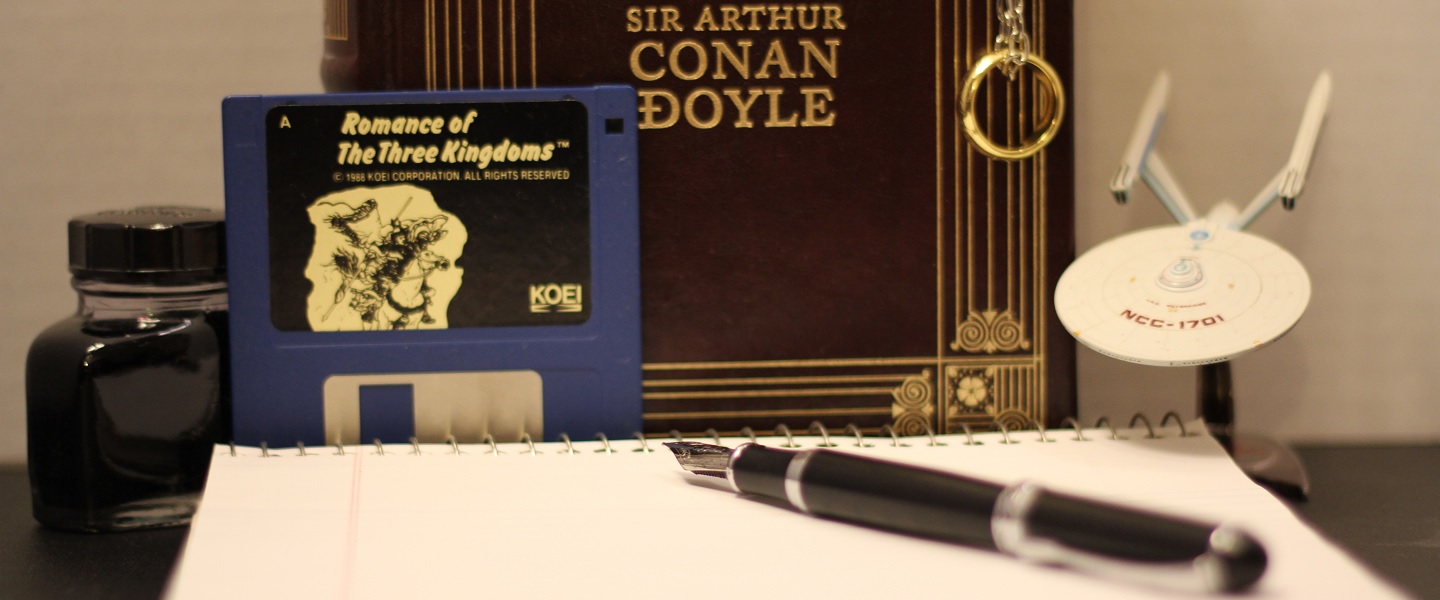
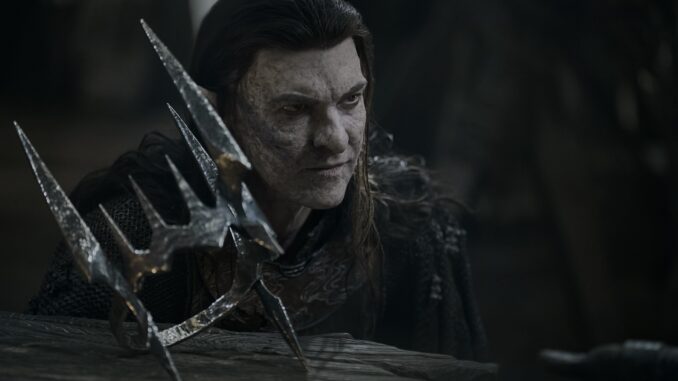
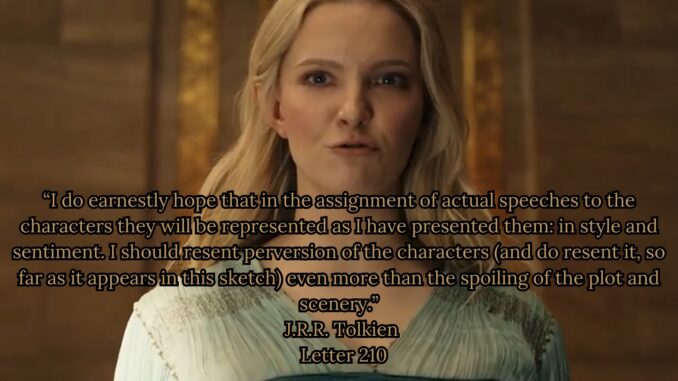



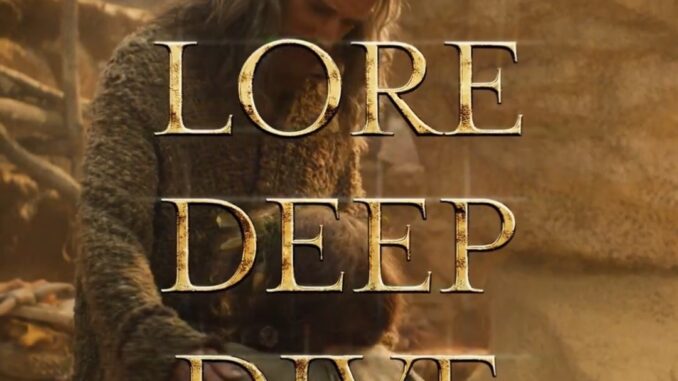
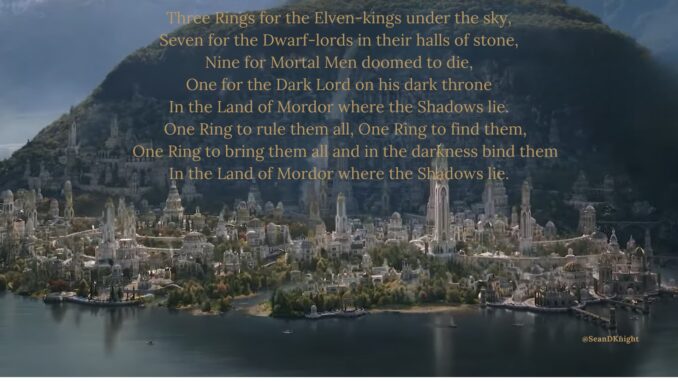
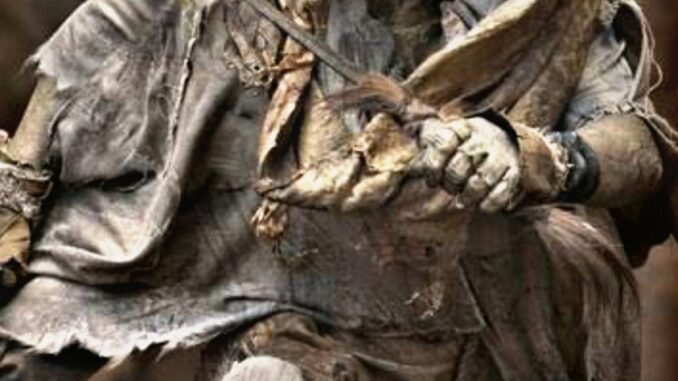
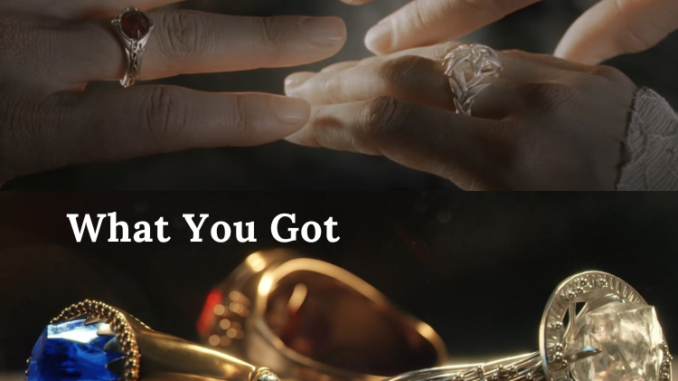

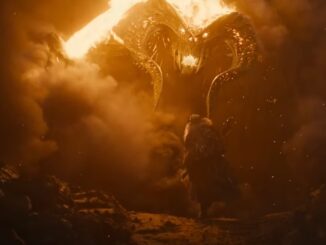
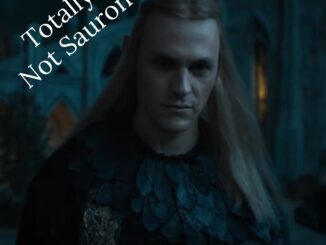
[…] [ October 29, 2024 ] Tolkien’s Corner: 10 Things Amazon’s The Rings of Power Did That Di… […]
[…] for you, it behooves the Tolkien community to make sure ROP fails so that this kind of disrespect to Tolkien and his work is never replicated by other greedy studios wanting to ride the Tolkien train while simultaneously […]
[…] this is The Rings of Power’s Disney Sauron – speaking thoughts out loud, saying that the undermining and disrespect of Tolkien is for the betterment of Middle-earth in order to reach the “modern audience”. Thoughts which […]
[…] Power is plagued with a plethora of issues. From its poor writing, to miscasting of characters, to ignoring J.R.R. Tolkien’s canon, and more, one would think that the show could at least get the rings of power right. Right? Sadly, […]
[…] its $1 billion budget, The Rings of Power’s poor writing, non-canonical take on Tolkien’s work, disrespect of Tolkien himself, and out-of-character portrayals of Lord of the Rings characters resulted in backlash from the […]
[…] is no reason to even mention J.R.R Tolkien at this point since The Rings of Power has done everything it can to distance itself from […]
[…] see Elrond passing something to Galadriel), that there is no respect for Tolkien’s characters, no respect for Tolkien’s world, and no understanding of how Tolkien’s elves view […]